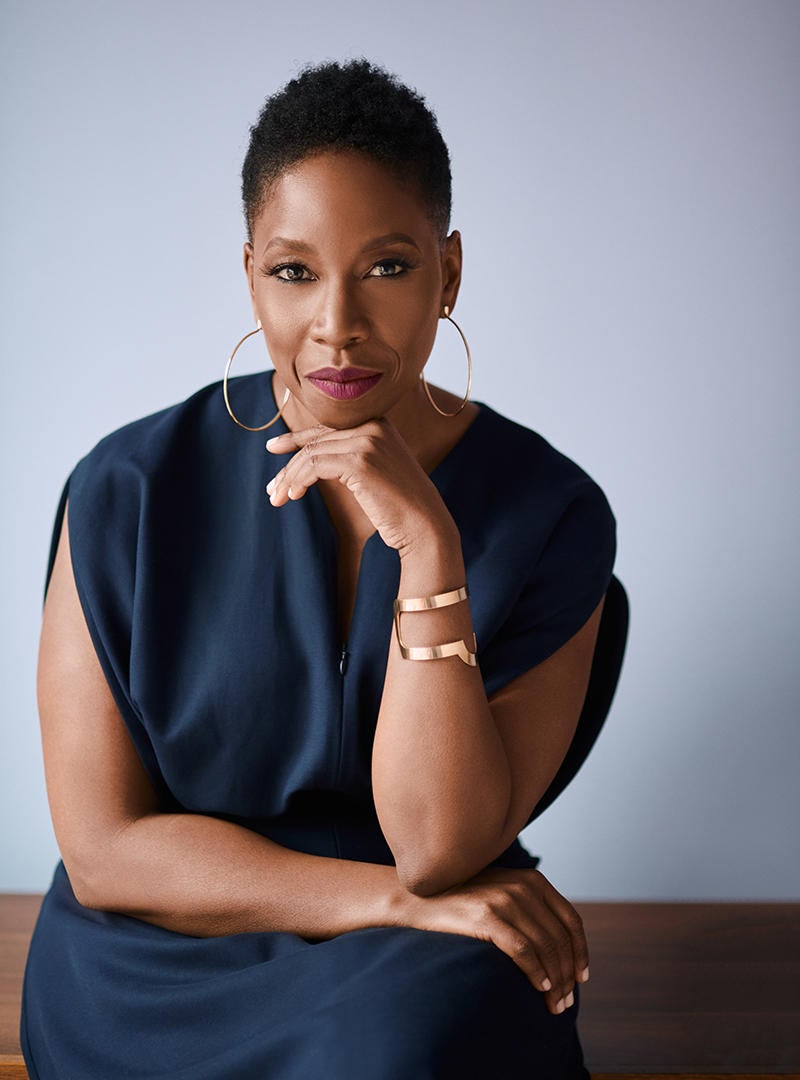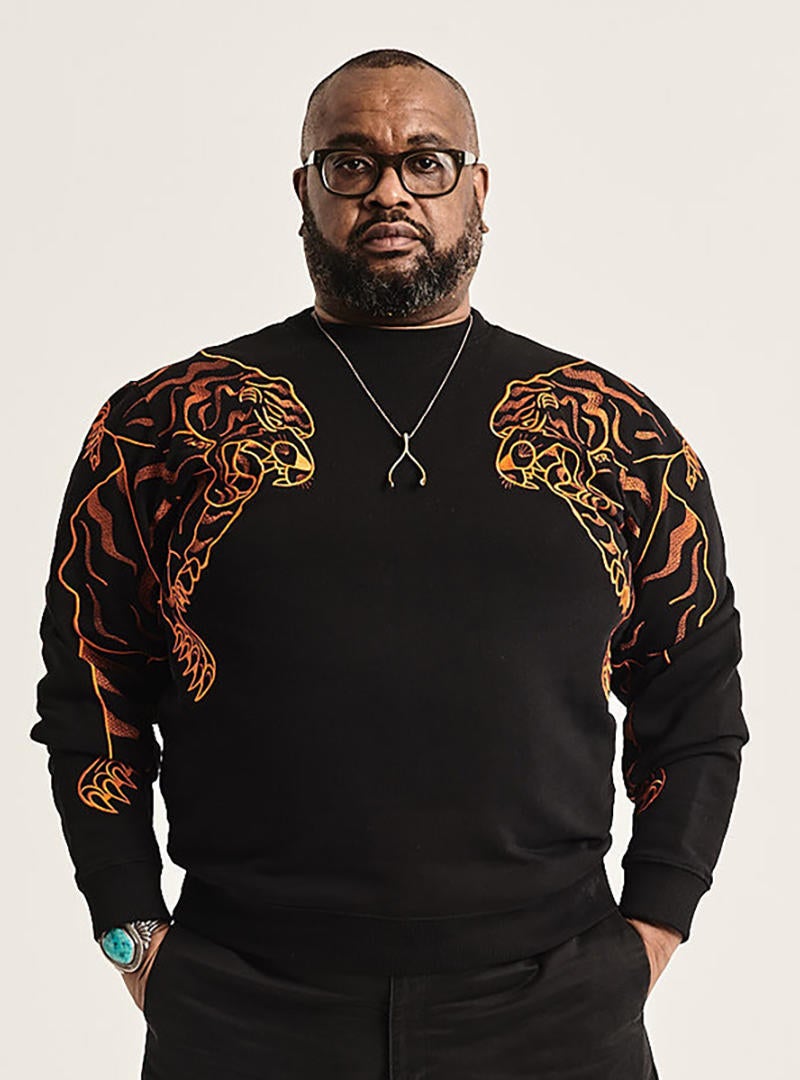A little over two years ago, artist Malene Barnett started the Black Artists + Designers Guild with the goal of combating the lack of representation of Black creatives in design. Since an early meeting of 12 at the Fabricut showroom in New York, the group has grown to more than 200 from all across the world; its work has been celebrated at industry events ranging from High Point to NY Now; and its members have graced magazine covers and earned spots on the AD100. Now, BADG has its first house project—but it’s not the typical “15 rooms in an unoccupied townhouse” experience.
“I realized early on that we needed to have our own project—a space where we get to explore not only our creativity but thinking about ‘What does space look like and what could it feel like knowing that Black bodies will occupy it?’” Barnett tells host Dennis Scully on the latest episode of the Business of Home podcast. “We took a different approach, not necessarily starting with, ‘Let’s find a pretty fabric and a couch and all the accessories and items.’ It was more about, ‘How do we connect to the community so we can build a space that supports our well-being and health and also think about our lifestyle and culture?’”


The resulting project, a virtual concept home called Obsidian, debuts online next week. The home, set in a hypothetical future of 2025 and rendered digitally on an imagined site in Oakland, California, showcases the work of 22 BADG members, ranging from interior designers to architects to artists. Beyond presenting beautiful rooms, the goal, say Barnett and designer Leyden Lewis, was to use the project as a testing ground for technology and design concepts crafted with the Black family in mind.
“[Architect] Nina Cooke John puts it really well: It’s more along the lines of a car show. Mercedes-Benz shows you what they’re envisioning 10 years from now,” says Lewis, who, along with Cooke John, designed the architecture of the Obsidian Virtual Concept House. “We wanted to say, ‘Let’s use that model to put together ideas that not only grab our story now but project that story into what’s being referred to as our ancestral future.’”
The home’s digital setting allowed its creators to explore concepts that would either be cost-prohibitive or technologically challenging in a real-life setting. There’s Barnett’s “Sankofa: Legacy Wall” installation, which combines terracotta tiles with an enormous digital screen, all backed by a computer that collects and displays the inhabitants’ family and medical history on voice command. Then there’s Lewis’s “Room of Requirement,” a multipurpose space that acts as both a virtual doctor’s office and a venue for sexual exploration.
These high-concept explorations sit alongside more day-to-day investigations of Black domesticity. The home, says Barnett, is designed to be an “anchor” house, a place where extended family can come and stay—a necessity that the artist says she and her BADG co-creators identified both from their own experience and through interviews with Black families at the outset of the project. A more disturbing practicality? Safety measures that the designers added as a response to the police killings of Black men and women that gripped the nation last spring—notably that of Breonna Taylor, who was shot in her own home.
“Safety is luxury,” says Lewis. “Can you imagine that we’d actually be thinking about an individual demographic group in America thinking about security as luxury? It’s pretty astounding.”
Listen to the episode and check out some takeaways below. If you like what you hear, subscribe on Apple Podcasts or Spotify. This episode was sponsored by Chairish and Universal Furniture.
Something New
Obsidian is not a typical showhouse, by design. It’s an idea that opened up a lot of new possibilities, says Barnett, but it presented a challenge to sponsors who are used to the typical “we loan you product, we get exposure” arrangement. “For some sponsors or corporations, they couldn’t understand. Because this is all brand-new. It’s brand-new for us, it’s brand-new for them,” she says. “We got a lot of opportunity for vendors to give us product, but we turned that down. We had to teach the vendors: No, this is how we’re doing it. We want you to be a part of it, but you have to understand this is our house, we have our own set of standards and rules. … It’s not about giving us product, because that doesn’t position us as creative thinkers if we just keep taking [and placing] product.”
Diversity vs. Equity
When we talk about racial injustice in the design industry, the words we use matter. A focus on “diversity,” says Barnett, leads to initiatives that showcase Black creatives without backing up that attention with economic investment in their businesses. Real change? It comes from equity. “There has been a confusion between what diversity is and equity is. Equity comes with a compensation that our members, our creators, have been lacking in this industry,” she says. “The companies who want to partner with us have to understand that yes, the exposure is great, but we want to grow our businesses.”
Open your rolodex
It can be daunting for even the most well-intentioned people—and companies—to commit to a more equitable industry. There’s no one way to make progress, say Barnett and Lewis. The first step is generally a personal engagement with the reality of injustice. From there, sustained financial contributions to organizations like BADG don’t hurt. Another way to spread equity, they say, is to widen your own circle and spread opportunity. “The money is one part, but opening up that Rolodex and making connections is another part, and I think they go hand in hand,” says Barnett. “When those opportunities do come in, why not think of somebody else that’s outside of your circle? Why not start to build a new circle of people that you can connect with and help grow their businesses, as well? If you keep going to lunch with the same people, they’re going to get all the opportunities.”
Homepage photo: A rendering of the Obsidian Virtual Concept House | Courtesy of BADG





























